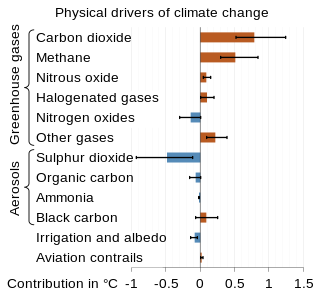
The scientific community has been investigating the causes of climate change for decades. After thousands of studies, it came to a consensus, where it is "unequivocal that human influence has warmed the atmosphere, ocean and land since pre-industrial times." This consensus is supported by around 200 scientific organizations worldwide, The dominant role in this climate change has been played by the direct emissions of carbon dioxide from the burning of fossil fuels. Indirect CO2 emissions from land use change, and the emissions of methane, nitrous oxide and other greenhouse gases play major supporting roles.
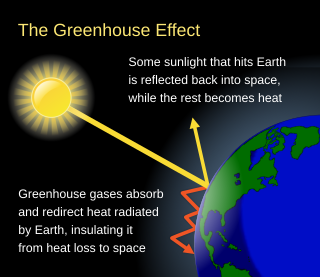
The greenhouse effect occurs when greenhouse gases in a planet's atmosphere insulate the planet from losing heat to space, raising its surface temperature. Surface heating can happen from an internal heat source as in the case of Jupiter, or from its host star as in the case of the Earth. In the case of Earth, the Sun emits shortwave radiation (sunlight) that passes through greenhouse gases to heat the Earth's surface. In response, the Earth's surface emits longwave radiation that is mostly absorbed by greenhouse gases. The absorption of longwave radiation prevents it from reaching space, reducing the rate at which the Earth can cool off.

The tiger is a large cat and a member of the genus Panthera native to Asia. It has a powerful, muscular body with a large head and paws, a long tail and orange fur with black, mostly vertical stripes. It is traditionally classified into nine recent subspecies, though some recognise only two subspecies, mainland Asian tigers and the island tigers of the Sunda Islands.
Atmospheric pressure, also known as air pressure or barometric pressure, is the pressure within the atmosphere of Earth. The standard atmosphere is a unit of pressure defined as 101,325 Pa (1,013.25 hPa), which is equivalent to 1,013.25 millibars, 760 mm Hg, 29.9212 inches Hg, or 14.696 psi. The atm unit is roughly equivalent to the mean sea-level atmospheric pressure on Earth; that is, the Earth's atmospheric pressure at sea level is approximately 1 atm.

The sulfate or sulphate ion is a polyatomic anion with the empirical formula SO2−4. Salts, acid derivatives, and peroxides of sulfate are widely used in industry. Sulfates occur widely in everyday life. Sulfates are salts of sulfuric acid and many are prepared from that acid.

The Mikoyan MiG-29 is a twin-engine fighter aircraft designed in the Soviet Union. Developed by the Mikoyan design bureau as an air superiority fighter during the 1970s, the MiG-29, along with the larger Sukhoi Su-27, was developed to counter the then new U.S. fighters such as the McDonnell Douglas F-15 Eagle and the General Dynamics F-16 Fighting Falcon. The MiG-29 entered service with the Soviet Air Forces in 1983.
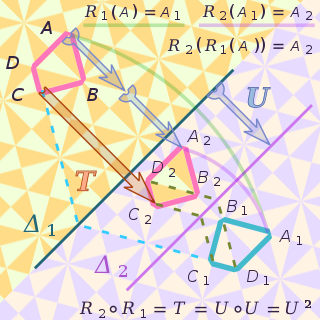
In mathematics, an isometry is a distance-preserving transformation between metric spaces, usually assumed to be bijective. The word isometry is derived from the Ancient Greek: ἴσος isos meaning "equal", and μέτρον metron meaning "measure". If the transformation is from a metric space to itself, it is a kind of geometric transformation known as a motion.
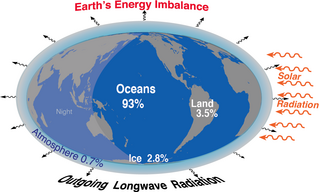
Earth's energy budget is the balance between the energy that Earth receives from the Sun and the energy the Earth loses back into outer space. Smaller energy sources, such as Earth's internal heat, are taken into consideration, but make a tiny contribution compared to solar energy. The energy budget also takes into account how energy moves through the climate system. The Sun heats the equatorial tropics more than the polar regions. Therefore, the amount of solar irradiance received by a certain region is unevenly distributed. As the energy seeks equilibrium across the planet, it drives interactions in Earth's climate system, i.e., Earth's water, ice, atmosphere, rocky crust, and all living things. The result is Earth's climate.

A Boltzmann machine, named after Ludwig Boltzmann is a spin-glass model with an external field, i.e., a Sherrington–Kirkpatrick model, that is a stochastic Ising model. It is a statistical physics technique applied in the context of cognitive science. It is also classified as a Markov random field.

The Group of Seven (G7) is an intergovernmental political and economic forum consisting of Canada, France, Germany, Italy, Japan, the United Kingdom and the United States; additionally, the European Union (EU) is a "non-enumerated member". It is organized around shared values of pluralism, liberal democracy, and representative government. G7 members are major IMF advanced economies.
The NatureServe conservation status system, maintained and presented by NatureServe in cooperation with the Natural Heritage Network, was developed in the United States in the 1980s by The Nature Conservancy (TNC) as a means for ranking or categorizing the relative imperilment of species of plants, animals, or other organisms, as well as natural ecological communities, on the global, national or subnational levels. These designations are also referred to as NatureServe ranks, NatureServe statuses, or Natural Heritage ranks. While the Nature Conservancy is no longer substantially involved in the maintenance of these ranks, the name TNC ranks is still sometimes encountered for them.

The G20 or Group of 20 is an intergovernmental forum comprising 19 sovereign countries, the European Union (EU), and the African Union (AU). It works to address major issues related to the global economy, such as international financial stability, climate change mitigation and sustainable development.
Internet Low Bitrate Codec (iLBC) is a royalty-free narrowband speech audio coding format and an open-source reference implementation (codec), developed by Global IP Solutions (GIPS) formerly Global IP Sound. It was formerly freeware with limitations on commercial use, but since 2011 it is available under a free software/open source license as a part of the open source WebRTC project. It is suitable for VoIP applications, streaming audio, archival and messaging. The algorithm is a version of block-independent linear predictive coding, with the choice of data frame lengths of 20 and 30 milliseconds. The encoded blocks have to be encapsulated in a suitable protocol for transport, usually the Real-time Transport Protocol (RTP).
internet Speech Audio Codec (iSAC) is a wideband speech codec, developed by Global IP Solutions (GIPS). It is suitable for VoIP applications and streaming audio. The encoded blocks have to be encapsulated in a suitable protocol for transport, e.g. RTP.

The Procter & Gamble Company (P&G) is an American multinational consumer goods corporation headquartered in Cincinnati, Ohio, founded in 1837 by William Procter and James Gamble. It specializes in a wide range of personal health/consumer health, personal care and hygiene products; these products are organized into several segments including beauty; grooming; health care; fabric and home care; and baby, feminine, and family care. Before the sale of Pringles and Duracell to Kellogg's and Berkshire Hathaway, respectively, its product portfolio also included food, snacks, beverages, and batteries. P&G is incorporated in Ohio.
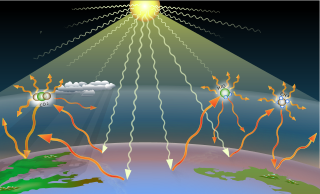
Greenhouse gases (GHGs) are the gases in the atmosphere that raise the surface temperature of planets such as the Earth. What distinguishes them from other gases is that they absorb the wavelengths of radiation that a planet emits, resulting in the greenhouse effect. The Earth is warmed by sunlight, causing its surface to radiate heat, which is then mostly absorbed by greenhouse gases. Without greenhouse gases in the atmosphere, the average temperature of Earth's surface would be about −18 °C (0 °F), rather than the present average of 15 °C (59 °F).
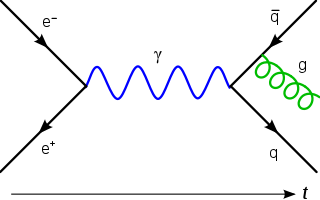
In physics, a gauge theory is a type of field theory in which the Lagrangian, and hence the dynamics of the system itself, do not change under local transformations according to certain smooth families of operations. Formally, the Lagrangian is invariant under these transformations.
Trade globalization is a type of economic globalization and a measure of economic integration. On a national scale, it loosely represents the proportion of all production that crosses the boundaries of a country, as well as the number of jobs in that country dependent upon external trade. On a global scale, it represents the proportion of all world production that is used for imports and exports between countries.












